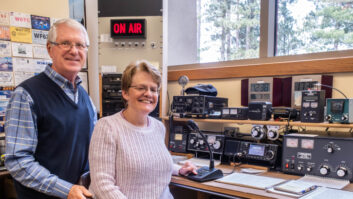
Photo: KQED/Christina Zee
Michael Englehaupt has been named KQED(FM)’s new Chief Technology Officer. He will play a key role as the public media company adds to its regionally-focused content and distribution across multiple platforms.
Englehaupt will oversee combined technical areas of television and radio engineering, television operations, IT and enterprise systems and the engineering and facility management operations for KQED Public Television and Radio, KQEH(TV) in the Silicon Valley (known as KQED Plus), KQET(TV) in Watsonville and KQEI(FM) Public Radio in Sacramento.
“At a time when the methods people use to consume media are rapidly changing, KQED plans to be at the forefront, which requires the ability to adapt rapidly,” KQED Executive Vice President and Chief Operating Officer Donald W. Derheim said. “With Mike, we know we have someone with passion for our particular work and has core strengths in KQED’s key services.”
Englehaupt most recently worked at CBS San Francisco’s TV stations KPIX/KBCW as the director of broadcast operations and engineering. He has been in the broadcast technology industry for 35 years, working in TV and radio technology operations for CBS, ABC and NBC stations in Los Angeles, Chicago and San Francisco. Englehaupt has experience in studio and remote engineering/operations, analog legacy-based systems to HD and IP-based multiplatform systems and workflows. He also implemented the rebuild of WLS(TV) in Chicago, the relocation of KABC(TV) to Glendale and rebuilt KPIX/KBCW in San Francisco.
Englehaupt has been responsible for the technology operations of two television stations, as well as daily management and multiyear strategic planning and facilitation of a multi-tenant 160,000 sq. ft. facility. He also supervised transmitter operations on Mt. Sutro and managed IT expansion to support 400 workstations and 120 servers.












